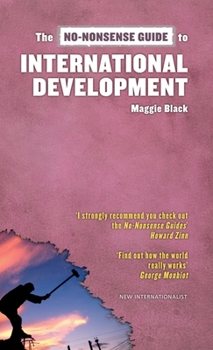The No-Nonsense Guide to International Development
(Part of the No-Nonsense Guides Series)
Select Format
Select Condition 
Book Overview
An exploration of all aspects of "development" that shows it should be more social than political.
Format:Paperback
Language:English
ISBN:1904456634
ISBN13:9781904456636
Release Date:October 2007
Publisher:New Internationalist
Length:144 Pages
Weight:0.35 lbs.
Dimensions:0.5" x 5.7" x 7.1"
Customer Reviews
5 ratings
Very informative
Published by Thriftbooks.com User , 14 years ago
Great short read. A must for International Development students. The book covers everything from sustainable development to development problems and does it without loosing the readers interest.
For those who think they know what Int'l Dev. is
Published by Thriftbooks.com User , 15 years ago
A great introductory guide for those who are intrigued by the subject. It offers no frills or fluff and stands as the bare-bones framework for understinding the International Development enterprise. If you thought you what "international development" is, this book is sure to set you straight. Concise, but informative, this book traces the history of the term to current perspectives on it. It is sure to clear up the most common misconception of the term "international development": which is the notion that there is an agreed definition of it - there isn't.
Essential reading for students of international development
Published by Thriftbooks.com User , 21 years ago
Short, concise and witty. This book should be on all student essential reading lists, as well as required reading for all international development 'experts'.Maggie Black has produced a basic guide to the current international development scene and tells us how we got to this chronic state of affairs. There is no panacea or quick fix, but she does make many suggestions on how we could go about undoing some of the harm perpetuated in the name of development.
Essential if depressing reading
Published by Thriftbooks.com User , 21 years ago
Anyone who is involved in the "development business" should read this book. As one would expect from this author, it's well-informed, beautifully written, and entirely persuasive. It's also brief enough to read in one session, by the end of which one is devastated by the realization that, whoever "development" benefits, it certainly isn't the poor (or any other currently fashionable "target population"). I wish that I had had the skill, at some point during my 35 years trying to help people in developing countries, to marshall these arguments and try to convince the remote decision-makers that process and buzz-words only take one so far - eventually one has to provide poor people with what they themselves need, want and value. Unfortunately, it seems unlikely that the international bureacracy will ever read this book or take its lessons to heart - but they should!
"According to statistics she does not work!"
Published by Thriftbooks.com User , 21 years ago
"ACCORDING TO STATISTICS SHE DOES NOT WORK!" That is the caption below a poster with a photograph of an African woman, lugging an enormous bunch of tree branches for firewood on her head, endlessly trailing through the Sahelian bush. The poster is published by what is probably the smallest and, typically, least publicized of all United Nations bodies, INSTRAW, the UN Institute for Research and Training on the Advancement of Women, based in Santo Domingo. That poster with its caption to this reviewer illustrates one of the many points, well taken and well given, by Maggie Black in the surprisingly small, immensely condensed volume on "International Development".There certainly is a wealth of literature on this subject out there, as well as journals, such as that of the publisher of this book, The New Internationalist. There seem to be very few documents, though, which in such concise, yet readable form present one of the most complex issues of our time.First of all, let me state that this book with its handy format should find its place in the pocket of anybody, anywhere in the world, in any professional and/or political camp, with an interest in making our globe more livable for everybody, or at least giving it a good try.In at least one country you can find in primary school libraries among all the school books and teachers' manuals, nothing less than Clausewitz' oeuvre on how to conduct a war. Without any other comparison, it appears that Maggie Black with this, her latest work, is becoming the Clausewitz of international development.Fact-loaded sentence by sentence, the reader is given as good a definition of "development" as you could get it. It is followed by an accurate description of the many variations of the theme, as it has unfolded since the end of World War Two, up to the UN Summit on Sustainable Development in Johannesburg in August 2002 - just a little over two months ago (this being written in mid-November 2002).Even for those with a long personal experience in development work, this work provides a wonderful overview, not the least in the historical part - witness to the author's academic background as a historian. Despite the small and incredibly fact-rich dimensions of the book, Maggie Black manages to insert human examples with real people exemplifying where some of the ideas came from, and what it took to achieve some results."International development" and the "development industry" grown up around this issue have many critics, some even verging on cynicism. This slim volume helps to clarify the issues, giving the truth, the truth, and nothing but the truth. In the same time it avoids the many political pitfalls, in writing such a review, or, really, evaluation. Against the backdrop of so much emotion, frequently violent around the development of humanity and its agents and agencies, rarely does one see such an evenhanded approach as that presented here.In spite of the many setbacks, the winding way of history, and the contin




